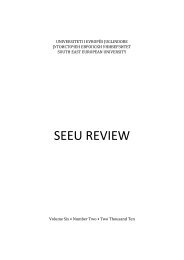SEEU Review vol. 5 Nr. 2 (pdf) - South East European University
SEEU Review vol. 5 Nr. 2 (pdf) - South East European University
SEEU Review vol. 5 Nr. 2 (pdf) - South East European University
Create successful ePaper yourself
Turn your PDF publications into a flip-book with our unique Google optimized e-Paper software.
<strong>SEEU</strong> <strong>Review</strong> Volume 5, No. 2, 2009<br />
Thus, the only alternative was a right dictatorship, like those of Italy and<br />
Germany, but adapted to the Albanian conditions. Toto called for the king,<br />
as the leader of the young generation, to proclaim the dictatorship and work<br />
for building a regenerated nation. But his hopes were not fulfilled, because<br />
the king did not support his views. Disillusioned from the failure of the<br />
“liberal” government in 1937, Ismet Toto joined in an unsuccessful coup d’<br />
etat led by his brother, the former minister of interior in Frashëri government<br />
and was captured by governmental forces and shortly afterward trialed and<br />
executed.<br />
Intellectuals who sympathized with communism and Soviet Union, did<br />
not constitute a homogeneous group, either. They favored the modernization<br />
of Albanian state and society, for overcoming the “Oriental” past, but at the<br />
same time expressed concern for the plight of the Albanian peasants and<br />
workers. Within the limits of the free speech during the monarchy, they<br />
criticized the government and the combined rule of “Oriental” landlords and<br />
urban bourgeoisie. They were also critical of the imperialist fervor of the<br />
<strong>European</strong> states and worried about the dependency of Albania on fascist<br />
Italy. Some left publicists of the period were part of the clandestine<br />
communist groups.<br />
In the 1930s, these intellectuals criticized the Occidental civilization, by<br />
focusing on two interrelated events in Europe: the economic crisis and the<br />
new imperialism of Italy and Germany. They highlighted the dire situation<br />
of the workers and peasants in Albania during the years of economic crises.<br />
Migjeni, in an ironic twist in one of his short stories, based on the life of<br />
common man in the city, pretended that at last the Albanian worker was<br />
equal to <strong>European</strong> worker, because both became unemployed: “So our<br />
worker wanders in the city roads. Looks for job. Like his colleagues in<br />
Berlin and London” (Migjeni 1998, p. 86). Nonda Bulka, a journalist, wrote<br />
in the same vein: “Do you consider a sign of civilization the wandering in<br />
the streets of London, New York, or Berlin, by millions of people<br />
demanding work or bread?” (Bulka 1980, p. 278).<br />
Bulka and others observed the tense atmosphere of international relations<br />
in the middle of 1930s. In one article in 1935 he mocks the civilizing<br />
pretensions of the Occident, in the light of the Abyssinian war: “In the times<br />
of Noah used to live a great and civilized people, called “<strong>European</strong> people”.<br />
The men composing this people were divided in different nations, which<br />
quarreled like dogs with one-another. Precisely these peoples (who quarreled<br />
like dogs) decided to spread their civilization beyond Europe” (Bulka 1980,<br />
p. 335). In this way, Great Britain and France “civilized” hundred millions of<br />
Africans and Asians and taught them English and French and sold these<br />
45

















